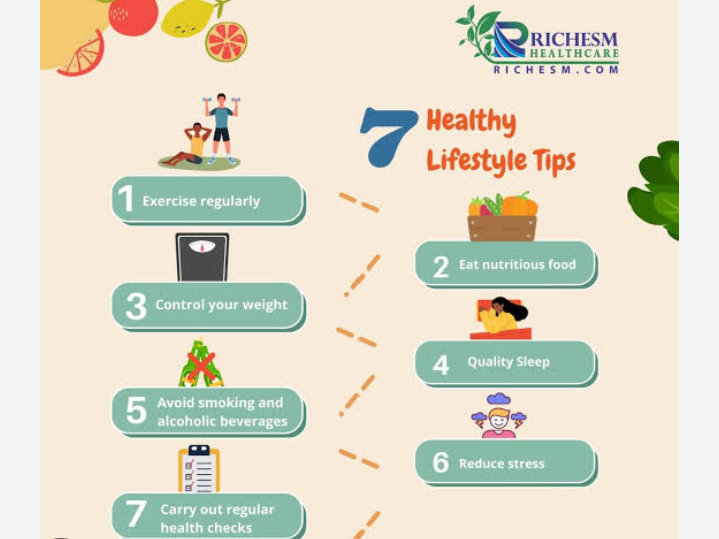Achieving a Balanced Lifestyle: How Health and Fitness Can Transform Your Life

## The Importance of a Balanced Lifestyle
Living a balanced lifestyle is essential for our overall well-being. It involves finding harmony between various aspects of
our lives, including physical health, mental well-being, and personal relationships. One key component of achieving this
balance is focusing on our health and fitness. When we prioritize our health and make conscious efforts to improve our
fitness levels, we can experience transformative changes in our lives.
How Health and Fitness Can Improve Your Overall Well-Being
Engaging in regular exercise and maintaining a healthy lifestyle can have numerous positive effects on our overall well-
being. Physical activity not only helps us maintain a healthy weight but also strengthens our muscles and bones,
enhances cardiovascular health, and boosts our immune system. Regular exercise is also known to reduce the risk of
chronic diseases such as heart disease, diabetes, and certain types of cancer.
Furthermore, committing to a healthy lifestyle can improve our mental well-being. Exercise releases endorphins, also
known as "feel-good" hormones, which can help alleviate stress, anxiety, and depression. It also promotes better sleep
patterns, increases cognitive function, and enhances our ability to focus and concentrate. By incorporating health and
fitness into our lives, we can experience a significant improvement in our overall quality of life.
Benefits of Regular Exercise

Regular exercise offers a multitude of benefits that extend beyond physical well-being. Firstly, it helps us manage our
weight by burning calories and increasing our metabolism. Engaging in activities such as cardio exercises, strength
training, and yoga can help us achieve and maintain a healthy weight.
Additionally, exercise plays a crucial role in improving our cardiovascular health. It strengthens our heart and improves
blood circulation, reducing the risk of heart disease and stroke. Regular physical activity also lowers blood pressure and
improves cholesterol levels, further promoting heart health.
Exercise is also known to boost our energy levels and improve our stamina. By engaging in regular physical activity, we increase our lung capacity and improve oxygen flow to our muscles, allowing us to perform daily tasks with greater ease and efficiency.
The Role of Nutrition in Achieving a Balanced Lifestyle
While regular exercise is crucial for our overall health, it is equally important to pay attention to our nutrition. A balanced diet provides our bodies with the necessary nutrients to function optimally. It is essential to consume a variety
of foods from different food groups, including fruits, vegetables, whole grains, lean proteins, and healthy fats.
A well-balanced diet not only fuels our bodies but also supports our immune system, helps with digestion, and promotes healthy skin. It also plays a significant role in preventing chronic diseases such as diabetes, obesity, and certain types of cancer.
Tips for Maintaining a Healthy Diet
Maintaining a healthy diet can sometimes be challenging, but with a few simple tips, it becomes more manageable.
Firstly, it is important to plan your meals in advance. This helps ensure that you have nutritious options readily available, reducing the likelihood of making unhealthy food choices.
Another helpful tip is to focus on portion control. Pay attention to the recommended serving sizes and try to avoid overeating. Eating slowly and mindfully can also help you become more aware of your body's hunger and fullness cues.
Lastly, make an effort to reduce your intake of processed and sugary foods. Instead, opt for whole, unprocessed foods
that are rich in nutrients. Remember to hydrate adequately by drinking plenty of water throughout the day.
Incorporating Physical Activity Into Your Daily Routine
Finding time for exercise can be challenging, especially with busy schedules. However, it is essential to prioritize physical activity and make it a part of your daily routine. Here are a few tips to help you incorporate exercise into your busy lifestyle:
1. Schedule it: Treat exercise as an important appointment and schedule it into your calendar. Set aside specific
times for physical activity and make it a non-negotiable part of your day.
2. Make it enjoyable: Choose activities that you genuinely enjoy. Whether it's dancing, swimming, hiking, or playing a
sport, find something that brings you joy and makes you look forward to being active.
3. Be flexible: If you can't commit to a long workout session, break it down into shorter bursts of activity throughout the day. Even 10 minutes of exercise can make a difference.
4. Multitask: Look for opportunities to be active while completing other tasks. For example, take the stairs instead of
the elevator, walk or bike to work, or do squats while brushing your teeth.
Remember, consistency is key. Aim for at least 150 minutes of moderate-intensity exercise or 75 minutes of vigorous-
intensity exercise each week, spread out over several days.
Finding Motivation and Staying Committed to Your Health and Fitness

Goals
Staying motivated and committed to your health and fitness goals can be challenging, but with the right strategies, it
becomes more achievable. Here are some tips to help you stay on track:
1. Set realistic goals: Start by setting achievable goals that are specific, measurable, attainable, relevant, and time-
bound (SMART). Break your goals down into smaller milestones, and celebrate your progress along the way.
2. Find a support system: Surround yourself with like-minded individuals who share similar health and fitness goals.
Join a fitness class, find a workout buddy, or seek support from online communities. Having a support system can
provide motivation, accountability, and encouragement.
3. Track your progress: Keep a record of your workouts, meals, and progress. Seeing how far you've come can be
incredibly motivating and help you stay committed to your goals.
4. Reward yourself: Celebrate your achievements by treating yourself to non-food rewards. Whether it's a spa day, a
new workout outfit, or a weekend getaway, acknowledging your hard work can help maintain your motivation.
Common Health and Fitness Myths Debunked
In the world of health and fitness, there are many myths and misconceptions. Let's debunk some common ones:
1. Myth: You need to spend hours at the gym to see results. Reality: Quality over quantity is key. Short, intense
workouts can be just as effective as long, drawn-out ones. Focus on the intensity and variety of your workouts
rather than the duration.
2. Myth: Carbohydrates should be avoided for weight loss. Reality: Carbohydrates are an essential source of energy for our bodies. The key is to choose complex carbohydrates, such as whole grains, fruits, and vegetables, over
refined carbohydrates like white bread and sugary snacks.
3. Myth: Spot reduction is possible. Reality: You cannot target fat loss in specific areas of your body. Instead, focus on overall weight loss through a combination of a healthy diet and regular exercise.
4. Myth: You need to take supplements to be healthy. Reality: While some individuals may benefit from specific supplements, a well-balanced diet should provide most of the nutrients your body needs. Consult with a healthcare professional before starting any supplements.
Health and Fitness Resources and Recommendations
To further support your health and fitness journey, here are some recommended resources:
1. Fitness apps: Use fitness apps like MyFitnessPal, Nike Training Club, or Strava to track your workouts, set goals,
and access workout routines.
2. Health and fitness websites: Visit reputable websites like Mayo Clinic, WebMD, or Healthline for evidence-based
information on various health and fitness topics.
3. Personal trainers or fitness coaches: Consider working with a certified personal trainer or fitness coach who can
create personalized workout plans and provide guidance and support.
4. Community programs: Check if your local community offers fitness classes, group workouts, or sports leagues.
These programs can provide a supportive environment and opportunities to meet like-minded individuals.
Conclusion
Achieving a balanced lifestyle is a lifelong journey that requires commitment and effort. By prioritizing your health and
fitness, you can experience transformative changes in all areas of your life. Regular exercise and a healthy diet not only
enhance your physical well-being but also improve your mental and emotional health.
Remember, it's important to set realistic goals, find a support system, and stay motivated. Don't fall for common health
and fitness myths and seek out reputable resources for guidance. Embrace a balanced lifestyle, and you'll reap the
rewards of improved overall well-being.
Take the first step towards a balanced lifestyle today and prioritize your health and fitness. Start small, stay consistent,
and watch as your life transforms for the better.


You must be logged in to post a comment.